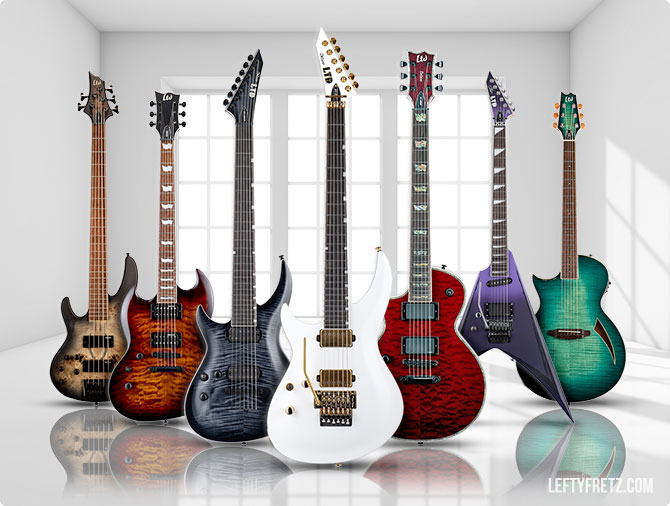ESP Guitars, From its humble beginnings in Tokyo to its status as a global leader in the industry, ESP has built a reputation for producing high-performance instruments that cater to a wide range of musical genres and styles. In this article, we delve into the history of ESP Guitars, its unique design philosophy, notable models, and its influence on the music industry.
A Brief History of ESP Guitars
ESP (Electric Sound Products) was founded in 1975 by Hisatake Shibuya in Tokyo, Japan. Initially, the company focused on crafting custom replacement guitar parts, such as necks and bodies. The quality of ESP’s parts quickly garnered attention from guitar enthusiasts and professionals alike, leading to the company’s expansion into producing complete guitars by the late 1970s.
ESP’s early success can be attributed to its commitment to craftsmanship and attention to detail. The company’s instruments were known for their high-quality components and excellent playability, which quickly attracted a loyal following. Throughout the 1980s, ESP expanded its presence in the United States, opening a workshop in New York City. This move further solidified ESP’s position as a leading guitar manufacturer, as the brand began to collaborate with prominent artists and produce signature models.
Design Philosophy and Innovation
One of the key factors that set ESP Guitars apart is its design philosophy. ESP focuses on creating instruments that are not only visually striking but also exceptionally functional. The company’s guitars are known for their sleek, aggressive designs, which have become popular among metal and hard rock musicians.
ESP’s innovative approach extends to its use of high-quality materials and advanced construction techniques. The company employs precision CNC machines to ensure accuracy and consistency in its guitar production. Additionally, ESP’s attention to detail is reflected in its meticulous hand-finishing processes, resulting in instruments that feel custom-made.
ESP is also known for its willingness to experiment with unconventional materials and construction methods. The company’s use of exotic woods, unique finishes, and custom hardware has contributed to its reputation for pushing the boundaries of guitar design. This commitment to innovation has made ESP a favorite among guitarists seeking instruments that stand out from the crowd.
Notable ESP Guitar Models
ESP offers a diverse range of guitar models that cater to various playing styles and musical genres. Below are some of the most notable models that have helped establish ESP’s reputation:
ESP Eclipse
The ESP Eclipse is one of the brand’s most iconic models, known for its single-cutaway design and versatile sound. The Eclipse is often compared to the classic Les Paul design, but it features several modern enhancements, such as contoured bodies, slim neck profiles, and high-output pickups. This combination of classic and contemporary elements makes the Eclipse a popular choice among rock and metal guitarists.
ESP Horizon
The ESP Horizon is a sleek and sophisticated guitar with a double-cutaway design, providing excellent access to the upper frets. This model is often favored by shredders and virtuosos due to its fast neck and smooth playability. The Horizon’s elegant design and tonal versatility make it suitable for a wide range of musical genres, from metal to jazz fusion.
ESP Viper
The ESP Viper is a distinctive guitar with a unique double-cutaway design, resembling an offset SG shape. This model is known for its aggressive styling and powerful sound, making it a favorite among metal and hard rock musicians. The Viper’s comfortable body shape and versatile tonal options have contributed to its popularity among guitarists seeking a bold and edgy instrument.
ESP M Series
The ESP M Series is a line of superstrat-style guitars designed for high-speed playing and versatility. These guitars feature slim neck profiles, Floyd Rose tremolo systems, and high-output pickups, making them ideal for shredders and metal musicians. The M Series’ modern design and technical features have made it a staple among guitarists who demand precision and performance.
Signature Series and Collaborations
ESP’s commitment to working with artists has resulted in a range of signature series guitars. The company collaborates with renowned guitarists to create custom instruments tailored to their specific preferences and playing styles. Some of the notable signature series models include:
ESP Kirk Hammett Signature Series
Metallica’s lead guitarist, Kirk Hammett, has a long-standing partnership with ESP. The Kirk Hammett Signature Series features guitars designed to meet his exacting standards, with features like skull-and-crossbone inlays, custom pickups, and unique finishes. These guitars are popular among Metallica fans and metal guitarists seeking a high-performance instrument.
ESP James Hetfield Signature Series
Metallica’s frontman, James Hetfield, also has his signature series with ESP. These guitars are known for their sleek designs, custom hardware, and high-output pickups, providing the power and aggression required for heavy metal. The James Hetfield Signature Series reflects his iconic style and has become a favorite among Metallica fans.
ESP Alexi Laiho Signature Series
The late Alexi Laiho, frontman for Children of Bodom, was known for his virtuosic guitar skills and aggressive playing style. ESP collaborated with him to create the Alexi Laiho Signature Series, featuring unique body shapes, scalloped frets, and custom graphics. These guitars are designed for speed and precision, making them a popular choice among metal shredders.
ESP’s Influence on the Music Industry
ESP Guitars has made a significant impact on the music industry, particularly within the realms of rock and metal. The company’s innovative designs and collaborations with prominent artists have contributed to its enduring popularity. ESP instruments are frequently seen on stage with some of the biggest names in music, solidifying the brand’s reputation as a top choice for professional guitarists.
ESP’s influence extends beyond its instruments, as the company actively supports the music community through sponsorships, clinics, and endorsements. By fostering relationships with artists and providing them with high-quality instruments, ESP has helped shape the sound and style of contemporary music.
Conclusion
ESP Guitars’ journey from a small Tokyo workshop to a global powerhouse in the guitar industry is a testament to the company’s commitment to craftsmanship, innovation, and collaboration. With a diverse range of models, signature series collaborations, and a design philosophy that balances tradition and modernity, ESP has established itself as a leading choice for guitarists seeking high-performance instruments. Whether you’re a metal shredder or a rock enthusiast, ESP Guitars offers a range of instruments designed to meet your unique playing style and musical aspirations.




